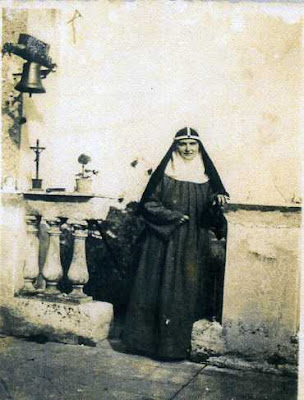ALICJA
LENCZEWSKA a Polish mystic and teacher was the author of two
spiritual diaries published under the title Testimony. Spiritual Diary and Word
of Instruction, in which she describes mainly her conversations
with Jesus Christ, as well as the Mother of God, angels
and saints, including St. Faustina.
She was born in 1934 in Warsaw. Her parents came from Eastern Lesser Poland (now Ukraine). Her father, August, was a typing teacher and inventor of a specific type of padlock, and her mother, Jadwiga, was a teacher. Her father died when she was two.
In 1940, she moved with her mother and older
brother, Sławomir, to the Rzeszów region,
then to Inowrocław, and finally, in 1946,
the family settled in Szczecin. Here she
passed her high school exams and then took a job as a village
teacher. She taught handicrafts and mechanics, and eventually became vice-principal of a
high school for preschool teachers.
She traveled extensively, enjoyed tourism,
and was interested in art history . She became
interested in religious issues after reading American books about the charismatic
renewal .
Before Alicja’s conversion, her faith was very superficial. As she mentioned, “There were several years when I lived outside the Church, almost completely in clear contradiction to the commandments of God.”
She persistently pursued the meaning of life, goodness, and beauty. “The longing for these pursued me through many countries for many years. But the time finally came when I increasingly felt the emptiness of such a life.”
She experienced her first mystical encounters
with Jesus during a retreat in Gostyń in 1985. Her spiritual guide was Father Walter
Rachwalik, who advised her to systematically record her visions, which she did
in her school notebooks from 1985 to 2010. As she later confessed, “Something happened there that completely changed my life.”
She eventually typed up the notes, destroying the originals (only three notebooks survive). In 1987, she retired
from work, though she continued to work as a volunteer in the parish office. She stated that in 1989
she began experiencing the pain of invisible stigmata.
She admitted, “Everything ceased to exist, there was only Him. His
power, might, and immense presence grew larger as I became smaller beside Him. Everything I had longed for and chased after in the world for so many years,
He gave to me.”
She began to read the Holy Scriptures
regularly, pray the rosary and the breviary, and fast on Wednesdays and Fridays
on bread and water. She organized and led
pilgrimages to Italy, the Holy Land, and Medjugorje.
She made her perpetual vows in the Family of the Heart of
Crucified Love. She went on pilgrimages and co-initiated the founding of the
community of the Apostles of Pure Love. In 2010, she was diagnosed with kidney cancer.
She is the author of two spiritual journals.
The first, Testimony. A Spiritual Journal, contains her notes
from 1985 to 1989. The second journal, Word of Instruction,
dates from 1989 to 2010.
On June 24, 2009, in some of the last words
written in Word of Instruction , she shared her understanding
of love for Jesus Christ.
In
2010 her mystical communications ceased and Alicja fell seriously ill. She
accepted her illness as a “gift from God” and maintained a cheerful disposition
until the end, as those who accompanied her attested.
Alicja
spent the last days of her earthly life in St. John`s hospice. This was her
choice, as she did not want to burden her brother Sławomir and sister-in-law
Dorota with her care. There she was also able to participate in the Eucharist
daily.
A day before she was
admitted, she broke her leg. The femur was so damaged by cancer that it broke
into two parts. The incident occurred at 6 a.m., but she did not inform her
sister-in-law by phone until 8 a.m. Then, her sister-in-law Dorota called an ambulance,
which took her to the hospital. It is likely that she did not want to wake up
the family and offered the associated suffering for some intention.
After her death in 2012, the local Archbishop of Szczecin-Kamień, Andrzej Dzięga,
appointed a theological commission to examine whether the content of her spiritual notes was consistent with the teaching of the Church. The theologians' opinion was unequivocally positive. Rev. Dr. Mieczysław Piotrowski, co-author of her biography stated that "these texts are among the pearls of religious literature".
Both publications received the imprimatur of the Vicar General and Auxiliary Bishop of the Archdiocese of Szczecin-Kamień, Henryk Wejman. "Today the widespread interest in Alicja Lenczewska’s texts indicates that this is
already a great work, and I think it will become even greater. Speaking quite
privately, I deeply believe that Alicja will be beatified one day,” admitted
Fr. Mariusz Sokołowski, SChr.
“…Alicja, as a
layperson, despite her earlier imperfections and later personal conversion, was
able to serve God’s cause devotedly and plead for the atonement for sinners
through her prayers and suffering. She thus became an apostle of Divine Mercy,”
Bishop Henryk Wejman, of the University of Szczecin, stated in “The Concept of Lay Spirituality: An Analytical
Study of the Writings of Alicja Lenczewska.”


















.jpg)


-640w.webp)




.jpg)


